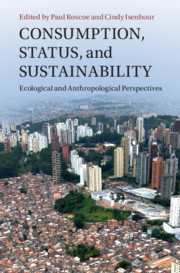Book contents
- Consumption, Status, and Sustainability
- New Directions In Sustainability And Society
- Consumption, Status, and Sustainability
- Copyright page
- Contents
- Figures
- Tables
- Contributors
- Preface
- 1 Standing Out, Fitting In, and the Consumption of the World
- Part I Status Competition and Hierarchy in Human Societies
- 2 “Status” Pursuits in Prehistory, and the Condition We Are In
- 3 Conflict Management, Status Competition, and Consumption in New Guinea, Medieval England, and Contemporary Britain
- Part II Variability in Status Consumption
- Part III Continuity and Discontinuity
- Part IV Bending the Curve
- Index
- References
3 - Conflict Management, Status Competition, and Consumption in New Guinea, Medieval England, and Contemporary Britain
from Part I - Status Competition and Hierarchy in Human Societies
Published online by Cambridge University Press: 30 July 2021
- Consumption, Status, and Sustainability
- New Directions In Sustainability And Society
- Consumption, Status, and Sustainability
- Copyright page
- Contents
- Figures
- Tables
- Contributors
- Preface
- 1 Standing Out, Fitting In, and the Consumption of the World
- Part I Status Competition and Hierarchy in Human Societies
- 2 “Status” Pursuits in Prehistory, and the Condition We Are In
- 3 Conflict Management, Status Competition, and Consumption in New Guinea, Medieval England, and Contemporary Britain
- Part II Variability in Status Consumption
- Part III Continuity and Discontinuity
- Part IV Bending the Curve
- Index
- References
Summary
A theory developed from New Guinea ethnography that finds status competition to be a conflict-management system also appears to apply to medieval England, where the system was monopolized by elites, and to quotidian life in contemporary Britain, albeit with a reduced reach and through an additional, novel avenue to status. These findings are deployed to discuss viable policy options for moderating environmentally damaging consumption in the contemporary world.
- Type
- Chapter
- Information
- Consumption, Status, and SustainabilityEcological and Anthropological Perspectives, pp. 59 - 84Publisher: Cambridge University PressPrint publication year: 2021

